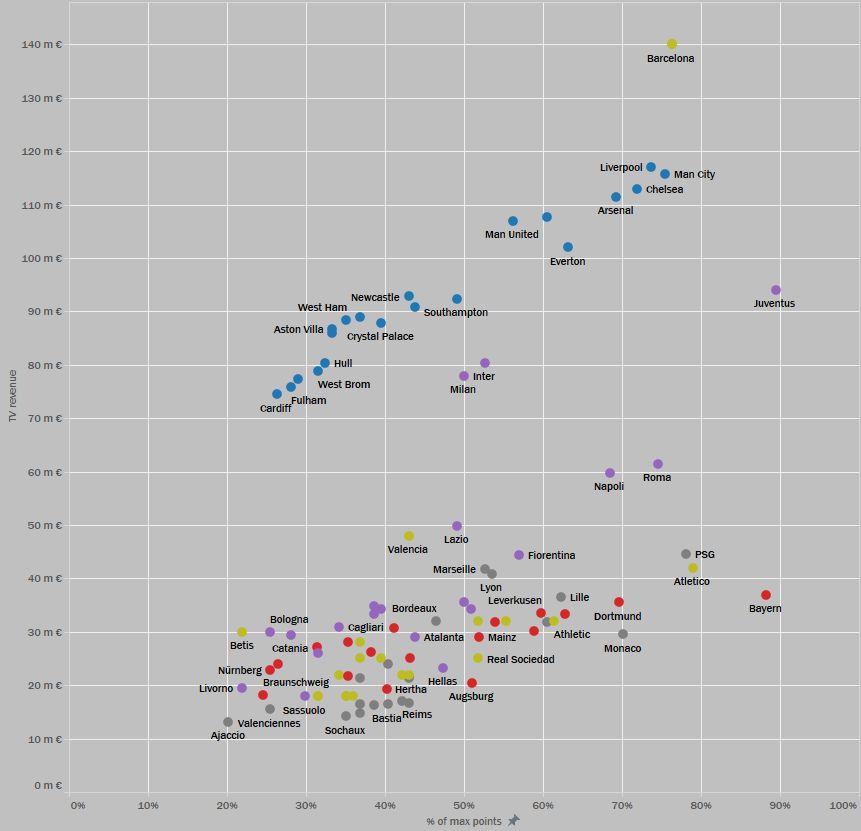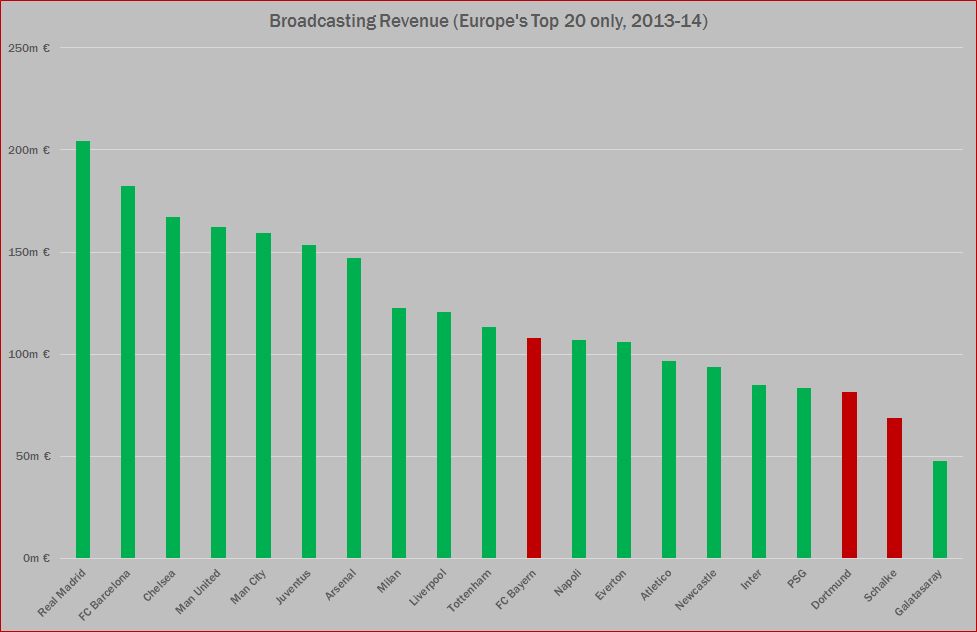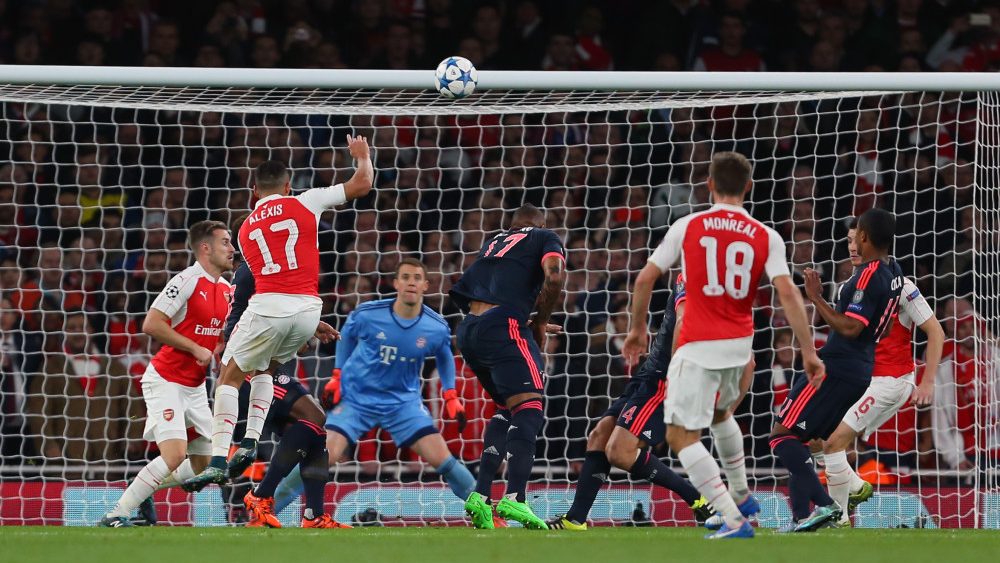State Of The Bundesliga – Part One
Broadcasting revenue
In football, video didn’t kill the radio star. Video is what turned them into superstars. TV revenue is probably the most discussed revenue in football. It’s the most transparent and most easily understandable income.
Generally speaking, there are two paths you can choose from. Either you allow each club within a league to sign an individual TV contract or you have the league negotiate for everyone. The advantages of each idea are obvious. On the one hand, you’ve got a revenue that fairly represents interest and demand of each club – that of course leads to extreme gaps within the league, as every country has a handful of clubs just way more popular than the rest. On the other hand, there’s a feeling of togetherness and solidarity in a collective contract that you have to be surprised to see inside such a capitalist system – an equality that hurts the popular clubs as they can only be sold as one of many.
The most popular league following model number one is Spain’s La Liga. Television contracts are determined by popularity and interest. It’s easy to guess which two clubs are at the top. The big advantage of this is that Barcelona and Real Madrid made more money than any other team in Europe (in 2013-14 at least). At the same time, you’ve got a major flaw, as the smallest clubs such as Almeria only made 13% of the TV money the big two made – only a handful of Ligue 1 teams made less than that.
The best example of the alternative is the Premier League. If you want to broadcast Man United matches, you have to buy West Bromwich Albion as well. The league has done a terrific job selling its product, managing to give at least one third of the clubs an international relevance. The gigantic size of their TV contracts is well known – in 2013-14, the lowest-paid English club (Cardiff) still received more broadcasting money than any other European club except Barca, Madrid, Juve, Inter and Milan. It’s an extremely equal distribution as the weakest Premier League club still receives 64% of the number one.
Where’s the Bundesliga in all of this? Mainly an awful version of the Premier League. No individual contracts are allowed and the distribution within the league is reasonably balanced – the weakest link receives half of what the top dogs earn, making the Bundesliga the only league getting close to the Premier League in terms of equality.
Gap between top and bottom in %
- Bundesliga – 51% (€18.7m)
- Premier League – 36% (€42.5m)
- La Liga – 87% (€122m)
- Serie A – 81% (€76.1m)
- Ligue 1 – 71% (€31.5m)
Here lies a huge problem of the Bundesliga. While the system itself is suited to create a balance, the volume of the TV revenue is far too low to have an actual effect. This creates two issues at the same time – a domestic one and an international one.
As mentioned before, the Bundesliga television deals are bad. In 2013-14, they had an average income of €27.5m for each club. To compare, La Liga lies at €37.8m, Serie A at €42.3m and even Ligue 1 comes close with €24.3m, as little sense as it would make in terms of reputation and interest. Just to complete the picture, I’m also gonna tell you that the average TV income in the Premier League was €93.7m which is more than three times of what the average Bundesliga team receives. This should cause a problem on the international market.
 The domestic TV income of each top-flight team in 2013-14.
The domestic TV income of each top-flight team in 2013-14.However, and this is highly remarkable, the leading Bundesliga clubs manage to stay at the elite level despite this shortcoming. In 2014, Bayern were the third-richest club in Europe despite making only €37m from domestic TV. Not only is this less than what clubs like Fiorentina, Valencia or Lyon make, it’s a gap of almost €60m to Juventus, of about €80m to a top English club and a gap of €100m to Barcelona and Real Madrid.
 Bayern (all numbers 2013-14) are clearly not rewarded for their dominating performances. NOTE: Real Madrid, not named in the graphic, share a dot with Barcelona
Bayern (all numbers 2013-14) are clearly not rewarded for their dominating performances. NOTE: Real Madrid, not named in the graphic, share a dot with BarcelonaJust by signing a TV deal like Barcelona have, Bayern would have an additional €100m available each and every year. This tells us two things: It’s incredible that Bayern stay competitive despite that huge difference, and that the Bundesliga hurts its clubs massively in this regard. If Bayern and Dortmund can be top clubs with such a shit TV deal, imagine what they would do with a quality income. You’d surely see more Bundesliga clubs perform well in Europe.
 Bundesliga teams (marked in red) showing their real weakness, mainly caused by the DFL.
Bundesliga teams (marked in red) showing their real weakness, mainly caused by the DFL.Funnily enough, there isn’t even much of a parity within the Bundesliga anyway. Teams that participate in the Champions League on a regular basis make more money with the UEFA than they get from the DFL – in 2014-15, Bayern received €50m from UEFA (135% of the TV money from the DFL) as the Champions League prize money has increased tenfold over the last 20 years. When five brothers share ten apples equally but then one brother receives another five apples from the neighbors all for himself, your intended equality isn’t worth much.
This gap in itself is neither bad nor good. While it hurts the current equality, having internationally competitive teams is an important factor in selling your league at a high price. It just doesn’t seem as if the DFL knows how to grow their product. Blaming it all on the lack of popularity for pay TV in Germany is a lame excuse, as it’s been proven time and time again that the thirst for Bundesliga football is as strong as ever.
Conclusion
Internally, the Bundesliga has a financial imbalance that is not caused by unfair distribution of funds. Ticket and TV revenue are distributed fairly – they are just too low to balance out the huge gaps caused by individual sponsorships.
Internationally, the low volume of the aforementioned sources of income is a big setback for the Bundesliga. The richest Bundesliga teams manage to compensate with great commercial revenue.
 Rich Bundesliga teams (far left) are extremely dependent on commercial income compared to rich clubs from other leagues.
Rich Bundesliga teams (far left) are extremely dependent on commercial income compared to rich clubs from other leagues.Other teams however lack that weapon, namely those that might not be so attractive to a multi-billion Euro company. That being said, you’ll find that internationally successful clubs such as Sevilla or Atletico have no real advantage in terms of TV or matchday revenue. It obviously isn’t all about the money, as we will show you in part two of this series – actual performances.
PART ONE – FINANCES AND REVENUE
PART TWO – POINTS AND SUCCESS
PART THREE – TACTICS AND MENTALITY












Interesting article. Sounds like Bayern and BVB need to get better negotiators (see NBA/NFL).
Btw, if you want to say the opposite of transparent, you can use the words “opaque” or non-transparent.
Cheers